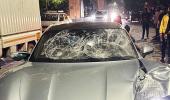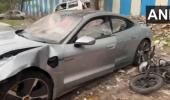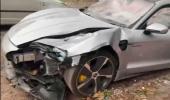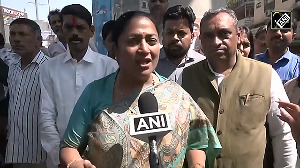The Bombay high court on Tuesday directed that the 17-year-old boy allegedly involved in the Porsche car accident in Pune be released immediately as the orders remanding him to an observation home were illegal and the law regarding juveniles must be implemented fully.

The teenager, who had got bail hours after the accident on May 19 but was sent to the observation home three days later following an outcry, was released in the evening following the HC order.
A division bench of Justices Bharati Dangre and Manjusha Deshpande said it was the court's bounden duty to prioritise justice above everything else, and it was not swayed by the uproar created because of the ghastly mishap which resulted in the loss of two innocent lives.
"Fiat Justitia Ruat Caelum, a latin phrase which connotes, "Let justice be done though the heavens fall," clearly convey a principle in law, that justice must be realised regardless of consequences and just decisions may be made at whatever cost it comes," the court said.
"We have all sympathies for the victim and their families, but as a court of law, we are bound to implement the law as it stands," the HC said.
The order was passed on a petition filed by the 17-year-old boy's paternal aunt, who claimed he was illegally detained.
As per the police, the teen was drunk and driving the luxury car belonging to his father, a real estate businessman, when it hit a two-wheeler in Kalyani Nagar area of Pune city in the early hours of May 19, killing a man and a woman, both IT professionals and 24 years old.
The HC on Tuesday quashed the orders issued by the Juvenile Justice Board remanding the minor to the observation home.
"We allow the petition and order his release. The CCL (Child in Conflict with Law) shall be in the care and custody of the petitioner (paternal aunt)," the court said.
The JJB's remand orders were illegal and passed without jurisdiction, the high court said, while also giving an earful to the police for the manner in which the entire situation was handled.
"Law enforcing agencies have succumbed to the public pressure, but we are of the firm opinion that the rule of law must prevail in every situation, howsoever catastrophic or calamitous the situation may be, and as Martin Luther King has rightly observed, 'Injustice anywhere is a threat to justice everywhere'," the court said.
The bench said it has no hesitation in coming to the conclusion that the three remand orders passed by the Board were "absolutely illegal and are afflicted with vice of lack of jurisdiction."
"The orders of remand were passed by the Board in an absolutely mechanical manner, without considering the most significant and pivotal fact that the CCL continues to be on bail and there is no cancellation or revocation of the order enlarging him on bail," the HC said.
The outcry, as a knee-jerk reaction to the accident, resulting into a clarion call of "see the accused's action and not his age", will have to be overlooked as a CCL is a child under the Juvenile Justice Act, the judges said.
"Being under 18 years and regardless of his crime, he must receive the same treatment, which every other child in conflict with law is entitled to receive," the HC said.
It said the court was bound by law, the aims and objectives of the Juvenile Justice Act and must treat him as any child in conflict with law separately from adult, despite the seriousness of the crime.
It said the Act was not only a beneficial piece of legislation but also remedial one, and rehabilitation and social integration are its hallmark with an individual care plan, preferably through family-based care.
Housing a child in an observation home is permitted only when he or she has not been released on bail. When bail has been granted, confining in an observation home is not permissible, the HC said.
The court said the accused is already under rehabilitation, which is the primary objective, and he is already referred to a psychologist and the same shall continue.
The police were rattled by the public outcry, it further observed.
"This is a classic case as to how the law enforcing as well as the law implementing agency reacted to the public outburst and treaded on a path of owing a moral responsibility of the CCL and his entire family, by alluding and questioning the upbringing of the the child belonging to the affluent family, by projecting their approach as having less regard to the lives of a common man on the road," HC said.
The accident took place in the early hours of May 19. The boy was granted bail the same day by the JJB and ordered to be under the care and supervision of his parents and grandfather. It also asked the boy to write a 300-word essay on road safety.
As the quick bail on lenient terms led to public outrage, the police filed an application before the JJB, seeking amendment of the bail order.
On May 22, the board ordered the boy to be taken into custody and remanded him to an observation home.
The HC order evoked an emotional reaction from the mother of Ashwini Koshta, who along with Anish Awadhiya (both were from Madhya Pradesh) was killed in the accident.
"I was shocked after seeing the news. I have full faith in the judiciary. They must have made the decision after careful consideration. However, I request the judges to understand the pain of a mother who has lost her daughter. Punishment should be given accordingly so that the public can trust the judicial system," said Mamta Koshta.










 © 2025
© 2025